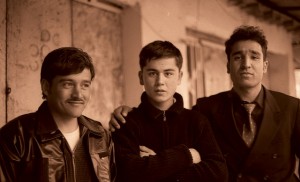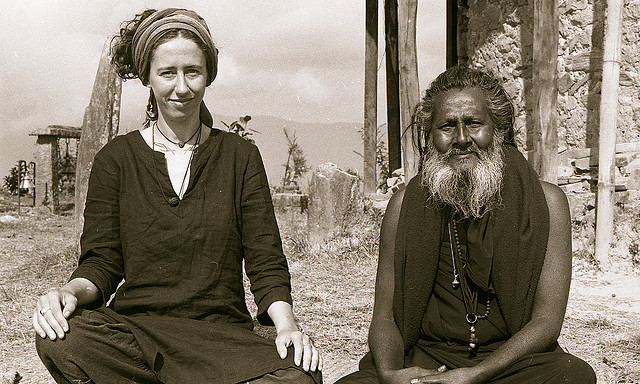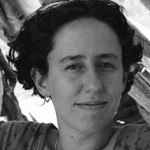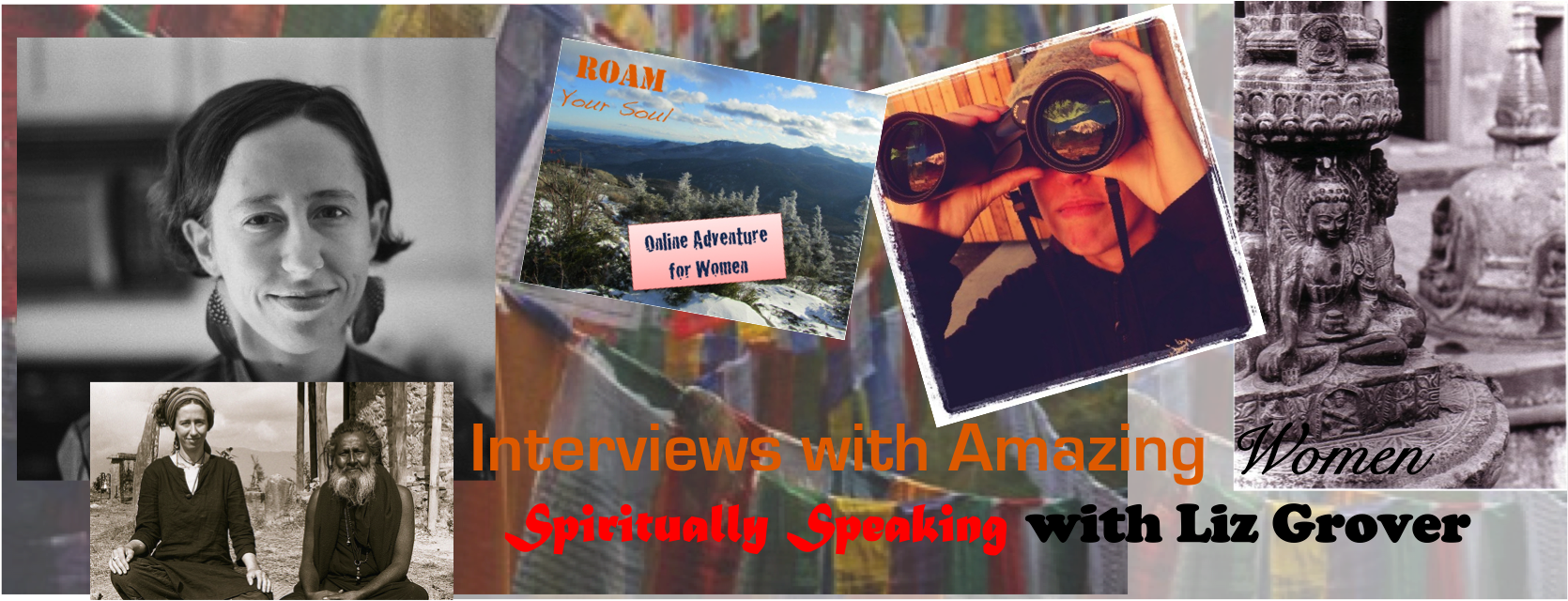Amazing Women Doing Amazing Things:
Spiritually Speaking with Liz Grover
Website: http://www.lizgrover.com/
Liz Grover is one of those reflective and airy souls that tend to migrate to the Portland, OR area. She’s an activist, spiritualist, centered individual that has a slew of stories she can tell you but you have to ask. She’s non-pretentious like that. Her travels and spiritual quests are how I became connected to Liz and how I came to interview her on a snowy afternoon in March.
Do you consider yourself a part of a community of amazing women?

I consider myself part of the global community. Women travelers are a unique breed. We have a lot of unique experiences and more restrictions in traveling.
I was treated really well in Afghanistan and in Kabul better than I thought. Sometimes though, I was treated as an object while traveling with a male friend and he wasn’t treated the same way as me. I didn’t like that feeling of inequality. There is a need for community within women travelers and I build it as much as I can.
Women’s empowerment outside of the US is the way that we’ll make the world a better place. It’s really important. Even the UN said that there is a huge imbalance of male and female energy on this planet.
How do you feel like your travels will help move the imbalance to balance?
When people in villages in Asia see me traveling alone they are almost in disbelief that I am traveling by myself and I’m welcomed because of it. I’m an oddity to them but they think it’s cool that I’m out there doing it on my own because women in their own society wouldn’t be travelling like I do and staying with strangers.

I think I impact people on an individual level. Also, I think that I have helped women to realize that they can be empowered and they can do a lot on their own. I was in Kabul where it isn’t culturally acceptable for women to ride bikes. It wasn’t the safest thing for me to do but living in Kabul was a gift and I had a lot of freedom but I also had some cultural constraints. Riding a bike was one of them. So I felt restless and took a bike ride through Kabul a couple of times. Women would look at me and giggle and smile and they were excited. I think it was putting myself at risk but it was good for them to see.
Women travelers are a unique breed. We have a lot of unique experiences and more restrictions in traveling.
The men were mad at me and were asking me, “Why are you doing this?” and a small child threw a piece of food at me just because I was riding a bike. I wanted to show women you can ride a bike and it’s not a sexual act.
I’ve impacted people on the individual level over the years and hopefully as I grow bigger in my work and my reach it can affect people on bigger levels. In America, I have done things that not even my society wants to do or expects me to be like. Our society has restrictions too. When I was 18 I drove across the country from Maine to California by myself and I was doing it as a job for this woman who thought I should have a man with me and it would be safer that way. I went by myself and I had a great time and it was very liberating.
When we first chatted, you mentioned you were writing a book. What was the inspiration and who is your ideal reader?
I wanted to go to Afghanistan to this place that had so many media stereotypes from America and I wanted to know what was really going on. I am experiential so I wanted to go experience it. I wanted to find positive stories to share with people in America that no matter where you go you can attract some amazingly positive, loving people. There is no “we’re good and they’re bad.” I wanted to come back and share that.
I have been sharing it through the internet and talks. And being a unique story where a young American woman went to Afghanistan in the middle of war, on the main stage in the world – I decided to share it as a book. It’s a unique story and it’s inspiring. Finding a publisher has been difficult and I feel it’s because I’m not famous enough. I thought unique and inspiring would be enough. I hope to turn it into a screenplay.
I interviewed a woman who was forced to cook for Pol Pot, the leader of the Cambodian genocide. It was either cook for him or die.
Who’s your ideal reader?
My ideal readers would be young adults because I want them to understand that anything is possible. It’s a really important age bracket where you can either wake up and say, “Anything is possible,” or go the other way and say, “I have to get the office job and a mortgage and plug into the American program.” As people get older, they get stuck in that culturally.
What projects are you working on right now?
I’m currently working on some serious film projects that will be public at a later date. One is a project I’m working on and the director is an Indian man who is out of the closet and proud of it. He’s in India and it’s harder to be “out” there than it is here. He has more of a challenge. He started the first gay film festival in India. The story is about an intercultural couple where an American loses his Indian partner and has to go to India for the first time in his life to tell the family of the loss. He has to tell the family that their son was gay. I like the story a lot because the Americans can’t claim that he’s not legally married to him. It also brings up issues of marriage rights for all.
You spent some time studying under the Karmapa, the supreme leader of one of the major lineages of Tibetan Buddhism. Tell us about that.
I was in Notre Dame, France for three months before I went to Nepal where I met Kali Baba.I’m not religious but I was in Notre Dame because I wanted to speak with someone in French. I went to confession so I could practice my French. Going to confession it’s their job to listen. I had frustration at the time because I could speak French but I was having trouble with sentences and felt the French didn’t have patience for me. My confession was that I wanted inner peace.
I always wanted to travel to places with extra money but in that situation I only had about $100 in my pocket and I realized that this is me experiencing what the Karmapa lives by.

That was the beginning of my journey for finding my inner strength and I just told the guy in French, “Yea, I want to get over my past and childhood and be a people person.” He prayed for me and I feel that meeting this teacher in Nepal was the answer to that. I was 21 in Nepal when I met a Hindu mystic in a mud hut in the Himalayas. He’s living in pure joy. I’ve never seen anything like it. He is in a place of joy and not worrying about a thing. His job is to be joyful. People take care of him because of that. People give him money and take care of him. He never asks. When I met him he was only eating one meal a day but he was healthy and strong and had a glow about him. I was really inspired by that and during my time with him my energy was turned on.
He would travel around Asia: India, Pakistan, Nepal with nothing but he always had faith that things would work out in the universe. This is not an easy belief to always carry. That’s why I went to Afghanistan with nothing. I always wanted to travel to places with extra money but in that situation I only had about $100 in my pocket and I realized that this is me experiencing what the Karmapa lives by.
You have met some amazing people through your travels. What is a story that was shared with you that changed or affected you?

I interviewed a woman who was forced to cook for Pol Pot, the leader of the Cambodian genocide. It was either cook for him or die. She had to cook for him for three years. She got separated from her family and even though I never experienced that it was one of those sobering moments when you realize, “Wow, I have so much freedom and such a gifted life.” What is amazing is that she survived a genocide, her brother was killed, she was away from her family for two years, and had no idea if they were alive. She couldn’t sleep the whole time. The Khmer Rouge (Cambodian solders) turned children into spies. Every time she would leave her hut she would see kids trying to hide out to find information and they would be eavesdropping.
After all of this, this woman was hopeful and smiling and happy. She became a prominent activist in Cambodia. If she can come out of that experience positive and hopeful, I think, for the rest of us who haven’t experienced that, we can follow in her footsteps and live life in positivity.
Talk about traveling responsibly and how traveling has opened your eyes up to how you impact a society.

Any traveler that goes to Asia goes to the beach. If you don’t know what’s going on in these places it seems like a pretty innocent thing to do. Sihanoukville is the capital of child sex trafficking in Cambodia and is a big beach town. I went there when I was 21 not knowing this. I felt weird and I didn’t want to be in the town but I was passing through and you could tell something was wrong but I couldn’t tell what it was. When I went back six years later, I found out it was a sex trafficking town and most of the hotel owners look the other way. People go there to prey on these kids and they pay off the hotel owners to look the other way. It makes me think about my choices and where I stay as a traveler and because I don’t want to pay money to a hotel that supports those kinds of things.
It boggled my mind why I didn’t take a stance against things like that . I know it’s almost impossible to stop it because there are just sick people in the world but it would be nice to have some kind of civil system and get these people out. When I went to stay in the town my friend told me which hotels to stay in that are against trafficking and unfortunately all those hotels were full. I ended up in a hotel and later as I was going around with an undercover detective, he pointed out my hotel as a traffic hotel.
There is a group of travelers, unintentionally or not, that don’t even have knowledge or don’t know where they are going and don’t realize what they are supporting. They go out to party and don’t think about these things. As far as interconnectivity, my choices as a consumer and a traveler directly affect people in Asia.
What is your favorite meal to cook/prepare on the road?
I like making Indian curries for people. Most people can’t find the curries that I make – they aren’t done in restaurants.
TP question: Folder or crumpler?
A crumpler.
Alright. We’ll add your vote on TP to our ongoing research analysis.
 Liz Grover travels the world as a spiritual activist, specializing in sharing the voices and events of social movements through writing, film, photography, and Internet media. She is an established speaker as a voice for peace and an inspiration for others to dare to face their fears by saying yes to their destiny. She is now producing her first feature length narrative film called Scarlet Poppy.
Liz Grover travels the world as a spiritual activist, specializing in sharing the voices and events of social movements through writing, film, photography, and Internet media. She is an established speaker as a voice for peace and an inspiration for others to dare to face their fears by saying yes to their destiny. She is now producing her first feature length narrative film called Scarlet Poppy.

